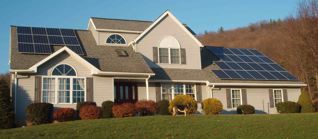 Preparing a holiday (Thanksgiving) meal using an electric stove provided a new twist for us this year.
Preparing a holiday (Thanksgiving) meal using an electric stove provided a new twist for us this year.
It turned out to be an eye-opening event.
The stove’s performance was enhanced in an unexpected way!
(Roof solar cell powered house photo ©2012 courtesy of DCH in conjunction with Sensory Nutrition.com)
Although prior to traveling to the other home site, we had packed up most items that would be required to cook the holiday meal off-site, we hadn’t packed up an oven thermometer. It turns out the house we went to didn’t have an oven thermometer on the premises.
Yes, there was a food thermometer to check for turkey doneness, however, there was no way to verify the oven temperature calibration, although the homeowner said that prior to the solar panel installation (which was that very week), the oven usually cooked up all her recipes to the times she was accustomed to as noted in the recipes and she never had to make adjustments.
The house we prepared the holiday meal at was (and still is) connected to the local electrical grid and previously only obtained electrical power (as did most other houses in that newer development) via a typical underground electrical feed line.
Now, during daylight hours, it potentially has access to a direct source of electrical energy generation courtesy of the action of the sun’s rays on Solar Panels recently installed on that house’s Southern facing roof. The system at this time is NOT using a battery backup system quite yet as final adjustments are being made.
Solar panels installed on the house’s roof contain photovoltaic cells. Those photovoltaic cells have the capacity to convert sunlight into electric current using the principles of the photoelectric effect.
It turns out that cooking during daylight hours on a very sunny Thanksgiving Day in a home that has solar panel direct access to energy generation means there is fairly constant conversion of DC to AC power via that solar panel system and NOT the usual power level fluctuations experienced when the stove was used previously only receiving power off the same main electrical line as all the other houses in the development.
The turkey breast cooked much faster than anticipated, as did everything else made in the stove’s oven or prepared on the stove’s burners. We’ve never had items cook so rapidly in a conventional oven–it was a real eye-opener. The times rivaled convection cooking.
The bottom line is to remind all of us of the importance of having and paying attention to an oven thermometer.
Just as brown outs can cause power levels to fluctuate and items to cook/bake more slowly unless you are keeping tabs on their progress and adjusting accordingly, it turns out that items can potentially cook a lot faster when there is constant current delivery to a home’s appliances via solar panels that are getting full sun the entire time you are using an electric stove (oven as well as burners). The only way to objectively measure that effect is by using a calibrated oven thermometer.
On a bright, non-stop sunny day, the same settings as you previously used will now actually provide more energy for cooking including baking/roasting than they previously did.
That extra boost of constant energy flow on a constantly bright sunny day means that water in a pan potentially boils faster than it previously did in the same pan at the same setting on the same electric burner. Items potentially cook faster in the same oven if you try using the previous temperature(s) noted in your recipes as in effect the oven is now hotter than it previously was at the identical “temperature setting” so you must adjust the setting accordingly. The energy flow is amazingly even and strong!
When there is bright, steady sunlight available to the solar panels feeding electricity to a house, you need to be prepared to turn down the levels for the burners and to check an oven thermometer and adjust (likely lower) your “temperature settings” accordingly to achieve a resultant oven temperature that can give you optimal desired results. Fortunately we basted the turkey every half hour and it was still moist, although it cooked in record time!
On the other hand, when the sun goes down, the solar panel system shuts off and then the entire house will go back to relying on the electrical grid in the area for any electrical feed (unless there is a battery backup system installed and functioning).
The solar panels will have fed electricity into the system during the bright daylight hours when the solar panels were turned on, but once the sun goes down the system shuts the solar panels off and there is not any direct energy feed from the panels and instead the electrical feed is again from the usual area electrical grid with its typical power fluctuations.
Baked goods are especially sensitive to oven temperatures, particularly cookies, so it really could make a difference for you as holiday baking season gets underway.
Typical power fluctuations can occur in any area of the country, so the motto of the story is to be sure to use an oven thermometer this holiday season!

